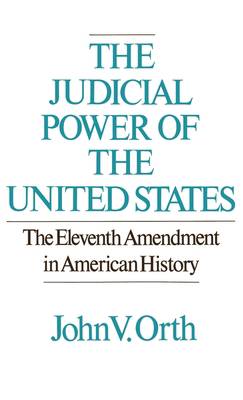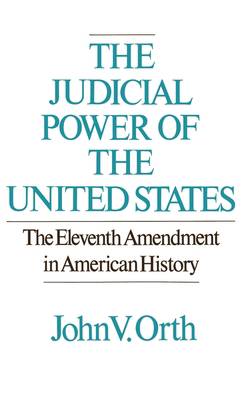
Je cadeautjes zeker op tijd in huis hebben voor de feestdagen? Kom langs in onze winkels en vind het perfecte geschenk!
- Afhalen na 1 uur in een winkel met voorraad
- Gratis thuislevering in België vanaf € 30
- Ruim aanbod met 7 miljoen producten
Je cadeautjes zeker op tijd in huis hebben voor de feestdagen? Kom langs in onze winkels en vind het perfecte geschenk!
- Afhalen na 1 uur in een winkel met voorraad
- Gratis thuislevering in België vanaf € 30
- Ruim aanbod met 7 miljoen producten
Zoeken
The Judicial Power of the United States
The Eleventh Amendment in American History
John V Orth
Hardcover | Engels
€ 322,45
+ 644 punten
Omschrijving
Although less than fifty words long, the meaning of the seemingly simple Eleventh Amendment has troubled the Supreme Court at crucial points in American history and continues to spur sharp debate in present-day courts. The first amendment adopted after the Bill of Rights, the Eleventh Amendment limits the exercise of U.S. judicial power when American states are sued. Its modern meaning was largely shaped around cases concerning the liability of Southern states to pay their debts during and after Reconstruction; by shielding states from liability, the Supreme Court's interpretation of the Eleventh Amendment eased the establishment of post-Reconstruction Southern society and left a maddeningly complicated law of federal jurisdiction. Here, Orth reconstructs the fascinating but obscure history of the Eleventh Amendment--the labyrinth of legal doctrine, the economic motives and consequences, the political context, and the legacy of the past--over the last two centuries. Using quotes from Wordsworth, Shaw, Mark Twain, Margaret Mitchell, and other writers to clarify and invigorate his narrative, Orth finally makes accessible an important but complex slice of constitutional history.
Specificaties
Betrokkenen
- Auteur(s):
- Uitgeverij:
Inhoud
- Aantal bladzijden:
- 244
- Taal:
- Engels
Eigenschappen
- Productcode (EAN):
- 9780195040999
- Verschijningsdatum:
- 22/01/1987
- Uitvoering:
- Hardcover
- Formaat:
- Genaaid
- Afmetingen:
- 148 mm x 227 mm
- Gewicht:
- 471 g

Alleen bij Standaard Boekhandel
+ 644 punten op je klantenkaart van Standaard Boekhandel
Beoordelingen
We publiceren alleen reviews die voldoen aan de voorwaarden voor reviews. Bekijk onze voorwaarden voor reviews.









